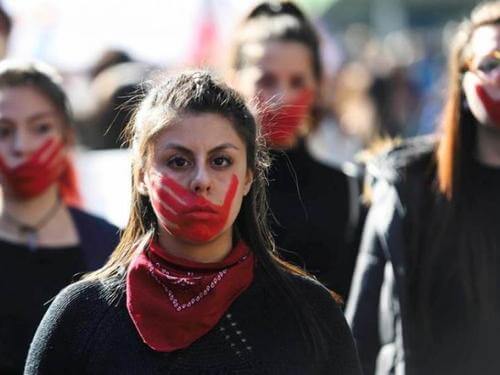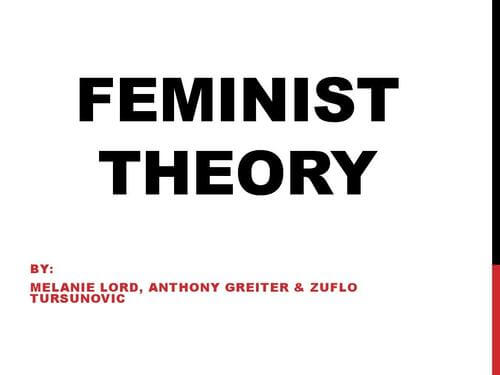Assessment 2
Name
Institution
Assessment 2
How does the Feminist IR Approach Question of Power? Outline One Issue in IR Approach Using a Feminist Approach
Feminist代写 How does the Feminist IR Approach Question of Power? Outline One Issue in IR Approach Using a Feminist Approach
Women and power have always got the limelight in international relations. Casas-Arce and Saiz (2015) stated that though men still dominate decision-making. It is remarkable that the number of women in parliaments, cabinets, judiciary and polices forces, formal employment and education has been on the rise. Thus, the increase in women representation in political and leadership positions is a good thing and progress to society. However, women do not have real powers. The reason being that they have always been and have remained a subject of sexism and prejudice. There are many powerful sectors and positions that women are underrepresented and hence a need for aggressive feministic approaches to advocate for inclusive policies in the international arena.
Feminist Theory Feminist代写
In the context of the theme of women and power, this paper will use feminist international relations theory and traditional theory to illuminate the issue of women in power (Ward, 2013). The theories seek to analyze gender relations and question how they work at all levels of global social, economic, and political life. Feminist theorists view international relations through the prism of gender relation vested on the fact that women, in the greater part of history, has been relegated from politics and governance (Longino, 2017).

This comes as a surprise because women constitute more than half of the world’s population. Men have continued to dominate majority in international practices. Also, women’s power is underpinned by different perspectives on women in different parts of the world. Nevertheless, women have proved that if granted the opportunity to lead, they have the power to bring positive changes.
Therefore, feminist theorists base their argument on the experiences of marginalized groups in the society including women so that they can be able to challenge the societal perception of women and their access to power positions. According to Maliniak, Power, an Walter (2013) feminist theory interrogates the traditional gender biases that have been embedded in the international relations between states, nations, power, security and global governance. The approach is based on rational arguments that women though are the majority, are underrepresented. The campaigns and advocacy by feminist theorists have tremendously bear some fruits as women have more power than before.
Principles of Feminist Theory Feminist代写
The theory functions within the precinct of sociology and shift the focus, assumptions, and analytical lenses away from masculine viewpoints and experiences and allay to that of women. Thus, feminist theory seeks to eliminate social problems and trends. That are historically overlooked by dominant male perspectives within the social theory. Feminist theorists are guided by principles including feminism, gender equality, gender performativity, social arrangements, care ethics, intersectionality, and standpoint theory. They ensure feminism discourse remains focused.
About Feminism and Why it Has Succeeded Feminist代写
Feminist theory is undeniably much about advocating for women equal representation at all spheres of life. It was in 1985 when the United Nations Decade for Women: Equality, Development, and Peace was held in Nairobi (Tripp, 2006). The event marked the birth of global feminism which embodied the ideology of feminist theory on IR and was taken a step farther by The Fourth World Conference on Women, held in Beijing in 1995. Power was the central focus of the feminism efforts.
Therefore, using these perspectives of power, the gender equality activists alias feminists, have advocated for the inclusion of women in international relations and powerful positions. While the progress of feminists might seem insignificant taken from one sector or region, generally overtime women have tremendously gained their rightful ground and voice they always sought to have. According to The Global Gender Gap Report 2015 (2015), though there was no country that has closed the gender gaps, there was significant progress in creating more inclusive societies within economic, political and social aspects. In this regard, feminists have succeeded in their approaches of advocating for equality in global power share.
Feminist Approach to Questions of Power Feminist代写
Feminists see powers as a resource, dominion, and empowerment. From the perspective of power as a resource, they see power as inequality distributed among women and men. The aim of this understanding is to ensure the redistribution of these resources with women have equal power to that of men. Those who understand power as dominion view it as not only power-over but also power-over relations that is ultimately unjust and illegitimate (Blackwell and Kane, 2015).
While strands of feminists theorize power as dominion and resource, there is a group that sees it as the ability to empower or transform oneself and others. In this perspective, the feminists try to avoid the definition of powers as subjective control by masculinity. The various ways feminists view power forms the basis on which feminists IR approach questions of power.
Although feminists subscribe to various ways and methods of understanding international relations.
They all converge on the fact that women are marginalized in international politics (Abubakar and Ahmad, 2014). Feminists theorists have analyzed the modern practices of IR and have established how it is gendered with gender equality completely ignored. The development in feminist theory has introduced “inter-sectional identities, post-colonial critiques of western feminism, and gender as a legitimating discourse” (Ackerly and True, 2006). The theorists posit that research and disciplines need to analyze gender as a problem that has a significant influence on the lives of men and women.
It is the viewpoint of traditional theories that IR should be understood from the prism of masculinity.

Feminist notions, particularly in the domestic spheres, are considered irrelevant (Fetterolf and Rudman, 2014). As such, traditional theories centralizer the power in its reference to international relations. Feminists see traditional theories mirroring power in terms of power over others. The nature of power as conceptualized by traditional theories is state-state-centric, masculinized and dominion over others.
Feminists view it as misleading since it does not recognize marginalized groups like women and the relations that work to keep in power. Thus, it is against the emerging ideals of power of shifting gender and class relations in the society and hence have a far-reaching negative impact on the international relations and the power of the state. The interpretation of power by traditional theories is misleading and should not be applied in the processes of international relations.
In this regard, feminists offer insight on how to reconceptualize power so that it is more accurate a representation of the origin of power in international politics. Feminist代写
First, to have more inclusive understanding of power, international relation theories should exclude conventional dichotomies of activities including social, political and economics that are not relevant in modern power interpretation of power. Traditional international relation theories exclude domestic consideration in the understanding of gender roles and power and thus reduce the scope of inquiry male-dominated high politics.
According to feminist theorist dichotomies of such nature need to be scrapped off to give better view of where power is located in international relations. The theorists have contributed to championing changes in traditional perspective of gender roles in power and propose for rework towards achieving equal platform for both men and women.
Following the understanding of international relations and power associated with it, feminist theorists propose a new perspective on power. Feminist代写
They called for power to be framed as cooperation rather than dominion. The suggestion is aligned with the approaches used in international relations in regard to the issue of power. Also, they were aligning the proposal to the rational and generic acceptance of cooperation power over dominion power in creating an equal society.
Moreover, feminist advocates push for the inclusion of women’s opinions and accommodation of feministic viewpoints in the methodologies of international relations. Scholars propose a collectivist approach to international relations where knowledge is developed based on the views of a particular group especially the minority or marginalized. If this is applied to power studies, where the oppressed and oppressor perspective is analyzed, there will be improvement in the understanding of power relations in society. The approach will offer a richer appreciation of power in international relations.
Critique Feminist代写
The emergence of feminism was not without criticism and opposition. Antifeminism was developed to oppose some of the ideologies propagated by feminists’ theorists. Clatterbaugh (2013), a philosopher, argued that antifeminists reject some principles of feminism including social arrangements that exist between men and women are not naturally or divinely determined. That these social arrangements favor men over women. That there exists collective action to create a more just and equitable social arrangement.
The argument of antifeminism can be based on the realism theory of international relations. In this context, realism is the tendency where men work to increase their power and thrive over women and hence have the upper hand in social arrangements. According to this theory, the main interest of masculinity is self-preservation and to gain dominion over women in various spheres of life including social, economic and political.
Feminist theorists have demonstrated the value of women in international relations as well as how they can be incorporated in more powerful positions. Beyond IR, women are considered agents of political, economic and social progress. However, there are those women feminists who claim to lead the inquiry towards the discourse of women’s inclusivity and equality in power and hence disguised to achieve their personal agenda and succumb to political influences. As a solution, sincerity in the arena of fighting for justice and equality is paramount. Women need to remain focused and unfettered by emerging antifeminist politics. Ultimately, a more inclusive and ungendered society will be possible.
References Feminist代写
Abubakar, M., & Ahmad, Z. B. (2014). Women and political participation: Toward the attainment of 35% affirmative action and obstacles to the women’s participation in Nigerian politics and the decision-making process.
Ackerly, B. A., & True, J. (2006). Studying the struggles and wishes of the age: Feminist theoretical methodology and feminist theoretical methods. Feminist methodologies for international relations, 241-260.
Blackwell, B. S., & Kane, K. (2015). Power‐Control Theory. The Encyclopedia of Crime and Punishment, 1-3.
Clatterbaugh, K. (2013). International encyclopedia of men and masculinities (pp. 21-22). London: Routledge. ISBN 978-0-41-533343-6.
Casas-Arce, P., & Saiz, A. (2015). Women and power: unpopular, unwilling, or held back?. Journal of Political Economy, 123(3), 641-669.
Fetterolf, J. C., & Rudman, L. A. (2014). Gender inequality in the home: The role of relative income, support for traditional gender roles, and perceived entitlement. Gender Issues, 31(3-4), 219-237.
Longino, H. E. (2017). Feminist epistemology. The Blackwell guide to epistemology, 325-353.
Maliniak, D., Powers, R., & Walter, B. F. (2013). The gender citation gap in international relations. International Organization, 67(4), 889-922.
Tripp, A. M. (2006). The evolution of transnational feminisms. Global Feminism: Transnational Women’s Activisms, 51-75.
The Global Gender Gap Report 2015 (2015). The Global Gender Gap Report. World Economic Forum. [online] Geneva, pp.1-387. Available at: http://www3.weforum.org/docs/GGGR2015/cover.pdf [Accessed 15 Oct. 2019].
Ward, S. (2013). The Third World Women’s Alliance Black Feminist Radicalism and Black Power Politics. The Black Power Movement (pp. 131-166). Routledge.
更多其他:人文社科代写 Review代写 艾莎代写 Case study代写 研究论文代写 Essay代写 艺术论文代写 文学论文代写 心理学论文代写 哲学论文代写 cs论文代写 学术代写 Report代写 cs代写 代写论文



